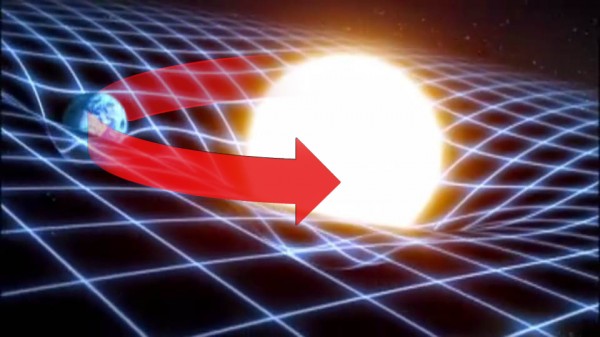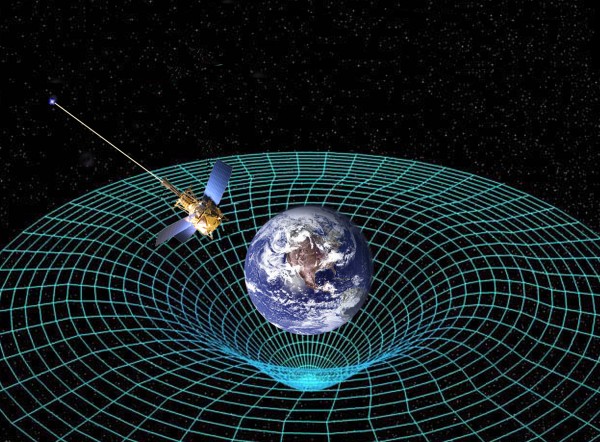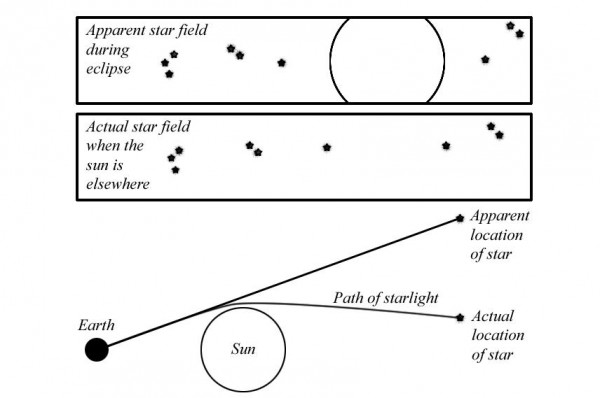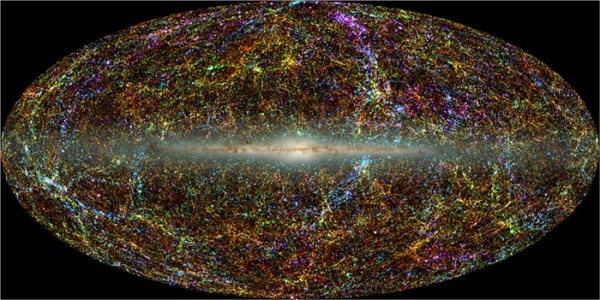"When I say, 'I love you,' it's not because I want you or because I can't have you. It has nothing to do with me. I love what you are, what you do, how you try. I've seen your kindness and your strength. I've seen the best and the worst of you. And I understand with perfect clarity exactly what you are." -Joss Whedon
I bet you love science; practically all of us do, whether we realize it or not. As children, we all live as scientists, born with no knowledge or experience of this world, but with inherent ability to learn and adapt.
Our senses help us tremendously with this: you burn yourself when you touch something that's extremely hot, so you learn not to touch fire. You learn that as you get closer to it, it feels warmer, so you learn to stay at a safe distance. You see the smoke rising up from it, and learn how to safely avoid getting burned. And as you gain experience and an understanding of fire, lava, and other scorching objects, you learn how to avoid touching something that looks like it could be too hot.
And you do alright, for a time.
 Image credit: Childproof Adjustable Stove Guard, from http://www.onestepahead.com/.
Image credit: Childproof Adjustable Stove Guard, from http://www.onestepahead.com/.
Until, perhaps, you learn that not all hot things look hot! But that pot on the stove burns you just as surely as the fire would, even though it didn't give off the same warning signals that the fire did.
That's okay, because you're a scientist! Your old theory -- or way of making sense of the world -- now gets revised, and replaced with a new one. Hot things don't just glow red, feel hot from a distance, or give off smoke (although some do), they have a variety of properties depending on just what the object is, and how hot it is. There are many ways to burn yourself, and as you build up your experience in the world, you start to learn that coming into contact with objects at extremely hot temperatures is the thing that will burn you.
And you do alright, for a while, until you encounter something very, very cold.
Very, very cold objects, like dry ice or liquid nitrogen, can also burn you! So again, your theory -- or your way of making sense of what will burn you -- changes yet again. It isn't just very hot objects, in all their varieties; your theory evolves to encompass all objects of extreme temperatures, which is to say, temperatures that are extremely different from your own skin's temperature!
In this sense, we're all scientists; every time we encounter something in the natural world that isn't explained by our current understanding of it, we revise our explanations so that they can explain both the old phenomena that our previous explanations took care of, but also explain the new phenomena that the archaic explanations are insufficient for.
In reality, we understand temperature by the properties of motion of molecules and atoms that makes up a material or system, and the temperature depends on the speeds and distribution of what it's made of. You -- a living creature -- can experience a burn if the atoms or molecules that make you up are made to move in a way that your body does not know how to accommodate. This can mean making your molecules move too fast, too slow, or simply with the wrong distribution can damage you.
Well, if you can forget what you learned about the scientific method for a minute, this is pretty much the path that science always takes. You have experiences and phenomena that you seek to explain and make sense of, so you create explanations for them. If your explanations can predict what's going to happen in a given situation, you've got a scientific theory.
Every scientific theory has predictive power, and something else that we don't normally think about: a range of validity. In other words, we're going to do experiments, make observations, and otherwise poke-and-prod the predictions of this theory. Ideally for a scientific theory, the range of validity will be as large as your experiments/observations permit, and the any discrepancies will be solely due to experimental/observational errors. This was why Newtonian gravity was the most successful theory of all time; it stood, unchallenged, for the better part of three centuries.
But if that ideal were met for your scientific theory, your field of science would never move forward. And yet, that's exactly what science does.
 Image credit: Wikimedia Commons user WillowW, using Blender.
Image credit: Wikimedia Commons user WillowW, using Blender.
When the orbit of the innermost planet -- Mercury -- failed to line up with the predictions of Newtonian gravity, this was both a crisis and an opportunity for physics. On the one hand, Newtonian gravity had a huge range of validity, from the smallest probed scales and weakest gravitational forces measurable all the way up to celestial bodies in motion around one another. The observed discrepancy was that Mercury's orbital path precessed at just a slightly different amount from the prediction: 5600"-per-century, as opposed to the 5557" predicted.
Yet that tiny difference -- that less-than-1% difference from the Newtonian prediction -- was real, and confirmed by centuries of observations from multiple points. It wasn't a random fluctuation, it wasn't a fluke observation, it wasn't due to a systematic error. Instead, this was an indication that something was different from our expectations.
There were a lot of possibilities as to what could have caused this. Newton's gravity being wrong was only one of them: there could have been a new mass (or set of masses) that were previously unseen, the Sun could have had different properties from what we assumed it had, or the solar corona could have been massive and extended, for example.
When observations or experiments aren't aligned with what a theory predicts, it doesn't mean that your theory is wrong or invalid, it may mean that there are physical effects -- perfectly explained by the science that's presently understood -- that we haven't accounted for. In fact, this is most frequently the resolution to an unexpected observation: a fundamentally understood physical phenomenon whose presence and application with respect to the problem-at-hand was unexpected.
There are two major problems with this being the truth: this is not what generally excites people's imaginations, and this is not what leads to a game-changing theoretical leap. So we run into a problem from scientists, science communicators and journalists: people immediately jump to the sensational, theoretical-leap explanation when we have these unexpected phenomena. The first question you should always ask yourself is whether it's possible that known physical laws and theories can explain this new observational or experimental result.
Now there's nothing wrong with entertaining the theoretical leap as a possibility; there's only something wrong if you entertain it as the only possibility. Because -- and pardon me here -- any idiot can speculate how the laws of nature might be different. If you want to go from idle speculation to solid science, there's a clear path, but it's a path that's only very rarely talked about.
First, if you intend to make a theoretical leap, your new theory must encompass all the successes of the old theory. Anything it could do, your new theory must do as well.
Second, you must explain the intended observation/experiment, thereby enhancing or extending the range-of-validity of your predictive power of the world. When DNA was discovered, it didn't replace genetics (which, in turn, didn't replace Darwinian evolution), it merely encompassed and extended it, providing a more powerful predictive framework for explaining the measurable/observable properties of living things. When Einstein's general relativity came out, it needed to explain everything Newton's gravity did, as well as to succeed where Newton's gravity failed: at correctly predicting the orbital behavior of Mercury, which it did.
And finally, this theory must make a new prediction (that's once again different from the old theories) which can be tested, and either verified or refuted. More than one is better, but at least one is absolutely necessary!
For general relativity, this was the prediction of the bending of starlight by dense, massive objects, proposed in the mid-1910s and verified observationally in 1919. (And many times since.)
So the next time you're reading a story that makes an extraordinary claim, ask yourself -- critically -- if the extraordinary claim is really necessary, or if science could explain it simply with what's already known.
Because the Universe is an amazing place, and science loves nothing better than to increase our understanding of how it all works. You can't really love science unless you understand what it is, so teach yourself how to spot those who would replace that knowledge with hype and speculation. As one of my (fellow scientist) friends said:
"[H]ow to do it right" will be ignored as long as "doing it right" requires sitting down and doing careful thought for more than 5 minutes. Better to get one more crap paper on your CV, than get the right (usually boring) answer.
Don't fall for the hype; as anyone who's lived it can tell you, there's nothing more exciting than getting it right for yourself! Do it for yourself, do it for the good of the world, and do it for the love of science!










At its best, science is like the Jack White song Love Interruption.
BANG-
(sound of nail being hit on head - again)
Nice.
and if we love nature
then we love the science
of understanding nature
as she is not as we wish
we must observe, hypothesize,
theorize and test
how else are we to know
she is this way or that
do we want to know
nature as she is
not as an ideal
a fanasy
but as she is
in beauty and terror
a prerequisite for such
truth seeking is
a willingness to be wrong
about everything
about oneself and one's beliefs
because if we come to nature
strongly prejudiced
(we are all weakly prejudiced)
then our clever minds
will misrepresent and deny
and we will not learn and understand
we must be willing to see
not only the blind spots in our eyes
but the blind spots in our minds
it takes courage to acknowledge
that our eyes and our minds
are sometimes blind and biased
yet if we wish to understand
ourselves and nature
we must not deceive
ourselves with fantasy
the tentative correctness
(not quite truth)
of science is not perfect
and love of science
like all love
see those imperfections
but love is blind
to those imperfections
only in the sense
that they part of the wonder
we are in love with the Mona Lisa
both her mole and her smile
and just so love of science
is fully aware of intrinsic limitations
nevertheless science is
a beauty to behold
Too few science posts begin with quotes from Buffy the Vampire Slayer. I'm glad you're working to fix that.
Note that there's significance in how this post, and almost all people, do not question the supposed equivalence of their sensory experience with "temperature" when, in fact, we don't experience temperature, we experience relative rates of "warming" and "cooling", and relative to our own temperature. This is dependent upon both heat capacity and thermal conductivity — as long as two surfaces are not exactly the same temperate as our nerves, even if they're the same temperate as each other they need not feel equally warm/cold. You can feel numerous objects left in a room to all settle to ambient and they won't all feel the same, even if they're the same temperature. We do not experience temperature directly. We experience heat transfer, and not absolute, but its rate. Furthermore, we have separate warming and cooling nerve receptors.
Using a child's experience of "hot" and "cold" as an empirical exploration of "temperature" is a misleading mish-mash of both our intuitive sensory experience and the inescapable technical term "temperature" in contemporary life. There is some important significance in this equivocation and how it is almost never challenged, even by people who know better.
Ethan! Do you think (or have) such a more simpler explanation which reveals the true picture of reality? I wonder what was in your head when you wrote this blog.
My idea of gravitational mass when applied to cosmology calculates invisible mass to the right portion of visible mass and the so called dark energy and more.
It is old yet novel. Physicists are puzzeled. Why do people still search for Dark Matter if my idea was all known already (as some Physicists say), and how can my idea violate existing Physics (as others say) if it is based on nothing but the most fundamental laws of nature?
Modern Physics stands with crutches because there is something wrong with its base - not head.
For the love of science.
I would say because your "old yet novel" idea is a load of bull.
But you can't stay away, can you. Just put on new socks and hey presto, begging for attention again.
How can you judge - rather than question - something that you don't know? - Do you work on Dark Matter?
If my "new" idea is a load of bull why does it calculate the ratio of visible to invisible mass to be 1/5.4 and the additional acting-kg's of D.E. to be 2.13x10^54? Thats pretty close I thought. That's why I don't discard it yet.
If no one ever dares to be wrong there would be no progress.
"How can you judge – rather than question – something that you don’t know? – Do you work on Dark Matter?"
Yes, do you?
"If no one ever dares to be wrong there would be no progress."
If no one ever dares to drop the wrong ideas, there's no progress.
I'm fond of thermodynamics. I have a different view of invisible mass. I do not believe my idea is the only possible truth. I'm an agnostic: we just don't know for sure at the moment and must examine everything that looks promising. I give it a go because it calculates the right values. Shame over me if I wouldn't do it, eh? Which one of the dark matter candidates do you think is the one?
Oh, so you when you asked "Why do people still search for Dark Matter if my idea was all known already?" the implied answer to this rhetorical question wasn't "Because scientists are silly and ignore the truth", but rather "Because even if my idea was as strong as I think it is, they should still pursue other avenues and are doing nothing wrong and in fact there was no reason for me to ask my rhetorical question in the first place."
Good to have that cleared up.
Or should we only examine alternatives if the alternative is your idea, but if we were examining your idea alternatives would be unnecessary?
Maybe I should have formulated better. My idea can be wrong. No prob with that. I havn't even mentioned my idea, but the reactions I get are interesting.
I believe scientists seek the truth because that is what science is - the seeking of truth. If there are a number of unproven alternatives, not all of us can be right and we have to consider each promising alternative for the truth to emerge eventually. I don't even know if my idea is any good, or if it was all just massive coincidences.
Important is that we keep a broad view and an open mind. However we specify, and if we work on something long enough we might eventually believe in it. Same trap as with religions.
I wouldn't be surprised if D.M. existed, so many people surely might not be wrong (?), but I also wouldn't be surprised if the truth would surprise us all.
No, your idea is almost definitely wrong.
You won't concede it as being possibly wrong, though, and insist that it MUST be right.
You're not seeking truth, you're seeking your ego.
Bugger off with your ridiculous rat-ass "theories", there are people wanting to learn something not be covered in shite.
Please stop your offensive comments Wow.
Why are you writing such obvious nonsense about me? I hope that people that read your comment will read my comment beforehand too. unfortunately there is no option to remove. Or is there?
You must obviously feel passionate for your Dark Matter candidate. And that is good. Why don't you allow someone else to feel passionate for hers?
This alternative finding for example I believe has a sound scientific base:
"The VPOS: a vast polar structure of satellite galaxies, globular clusters and streams around the Milky Way”, M. S. Pawlowski, J. Pflamm-Altenburg, P. Kroupa, Monthly Notices of the Royal Astronomical Society, in press".
It says that there might be no missing mass. If this was right, you and I were both wrong ;). We both believe that there is because there is striking evidence like bullet cluster or Abel. There are many different distribution patterns of DM and also different interpretations of data. I don't think we have the picture completely right just yet.
My missing mass is a certain energy, might be wrong though. What is yours WOW? Don't moan again. Tell me.
Please stop your vapid blitherings, cosmo.
"This alternative finding for example I believe has a sound scientific base: "
You only find it sound because you want the current science to be wrong. You have no other interest in anything besides that.
So current science is only what agrees with you? That paper is very current science. I have interests in finding answers. Like everyone else. Just answer me these:
Why are there some galaxies with no observational evidence for DM and others which seem to be entirely composed of it? And why does DM seem to behave differently from case to case?
This is not rhetorical. Does anyone know?
Isn't the Lambda-CDM model current science according to you Wow? Well it requests a 1/5 ratio of cold dark "mass". Just as my idea 'thinks'.
Do you claim you have the answer yet as to what this mass is? All we know is its gravitational effect. All I am going by is what we know for sure, what has been proven = current science without speculations!!! That is my definition of it.
"So current science is only what agrees with you?"
No.
Got any other stupid statements you'd like to get off your chest?
The paper you're talking about is fine.
What you're interpreting it to mean on here is not. It's bullshit.
Make sure you revise some of the science that you recently offered on another page. "your last to words". And mind your language. It does not look good. Just someone with a low selfesteem like me would bother with you. Bye bye.
Ah, http://en.wikipedia.org/wiki/Passive-aggressive_behavior
Again.
Sorry, if you talk rubbish in public, expect someone in the public to tell you. Don't like it? Keep the rubbish to yourself.
Here a copy-past. Kroupas words (leading prof), not mine.
Kroupa concludes by highlighting the wider significance of the new work. “Our model appears to rule out the presence of dark matter in the universe, threatening a central pillar of current cosmological theory. We see this as the beginning of a paradigm shift, one that will ultimately lead us to a new understanding of the universe we inhabit.”
Source: Royal Astronomical Society
Of course he thinks the idea will work.
Skepticism requires that we look at this askance. He ought to too, if that quote is from him from his paper and not him talking to a bunch of people about his paper.
Frankly, Pons thought his Cold Fusion experiment would be a paradigm shift.
Of course skepticism is important. Ideas must be tested against everything that could test them wrong. But if people wouldn't be passionate about their ideas, they wouldn't drive them forward. Mr. Nobelprize wrote to me "keep working at it ... it takes a 1000 mistakes before the right answer emerges". Some great mind and heart who's opinion I value. But isn't enough.
How high is the chance to coincidingly calculate right results from a nonsense idea? Shouldn't there be a lot of chance to be many orders out one way or the other? To be any distance of the right values?
Uh strawman.
Who's said either that you can't be skeptical or not passionate?
But you can't remain in denial. That's what happens when people, in the face of evidence, refuse to change. It isn't skepticism when you refuse to acknowledge evidence.
And there are an infinity of wrong numbers. Go hog wild and pick any number of wrong numbers you want.
Picking them and being "passionate" about it and "skeptical" of any competing number isn't science, though, it's denial.
What is a strawman? And what do you think I'm in denial about? There is striking evidence for the presence of dark mass, like lensing. But as to what causes the effects or what exactly the mass is, I don't think there is total agreement amongst scientists. Just that it is probably cold and dark and makes up ~84% of all matter. My "rat-tail theory" doesn't disagree, otherwise I would have thrown it out. It is probably wrong and I keep my mind open and focus on studying more. There is a lot of great ideas out there, not just one.
You and I wouldn't make a good team for the Mars mission :). Good luck with everyhting Wow. Honestly.
When you proclaim "Ideas must be tested against everything that could test them wrong." the inference is that this is being disputed and that the demand is NOT to test ideas.
The claim is that once tested, if failing, YOU DROP THE IDEA. However, you don't want to. You want to continue saying "But I'm a skeptic, therefore I don't believe the standard explanations and want people to investigate the most extreme outlier ideas instead, or you're not doing science!".
Your statements are so confused there's no way to find out what specific way you're wrong.
Are you talking about dark matter? Because the next sentence sort of requires you to be so. But if so, then lensing isn't how its existence is asserted to be valid.
If you're talking about black holes, then nobody is claiming that 84% of the mass of the universe is made of black holes.
But your statements are so confused and have so little actual information in, it is only certain you're wrong, but impossible to know which of those ways you could be wrong apply to what you MEANT rather than what you SAID.
Wow, Take care.
Non-sequitur.
Passive-agressive.
Lame.
I have written a hypothesis which explains the 'missing mass' by a relativity to an external frame without the need for an elementary particle to fill the gap. It's to do with invisible shift and why it is invisible- however becomes apparent through gravity. It explains why 83.44% (own number - coincidence - no numberology involved) is invisible - why we can see it one way but not the other, why the CMB imprint, falling appple ec.. Fact is the numbers work spot on. So I consider it a possibility - of course there could have been a lot of coincidences accumulating - I actually consider this option as more likely and that there is something else. But considering the striking coincidence of my hypothesis with observations, I'm not throwing it out based on the words of an internet troll who lifts his probably not suffieciently well questioned explanation on the level of absolute truth (I don't think WIMP can be called standart - given the large amount of well deserved scientists who think differently), but continue to ask others for their opinions because I never stop questioning my own idea.
Nice description of yourself there WOW.
The criteria for a PhD reveal the core of science:
Coming up with your own hypothesis/idea and testing it.
Developing own methodology.
Working your way along facts and evidence - but learning to separate facts and evidence from proclaimed truth which however still remains speculative. Stating such issues correctly.
A hypothesis can be proven right or wrong and an idea often changes along the way. Importantly a negatively proven hypothesis is still valued as much - because this demonstrates scientific work and a truly scientific mind. Because that is what science is about - not being right on the cost of science. As we get older it is important not to forget about these basics.
I am not in denial about anything if I i.e. do not accept the standart explanation (DM/WIMP) for the fact/evidence (microlensing, CMB-imprint) that we see out there as the absolute truth, but I'm remembering what my PhD teached me. Questioning. And a very important question always is "Is this the only possible explanation?" Intrinsic part of every discussion. All we can say is "DM/WIMP appears the most possible one at the moment".
Having an own idea about the topic and testing it and continuously rethinking it - however it turns out being aware that only 1 in a 1000 ever turns out - is what I believe makes me a scientist. Its my hobby!
My metaphorical first post ment that I was told my stuff was already known but I wasn't given any of the proclaimed standart references and never came accross any. That it violated some Physics - I still don't think it does violate anything - not thinking it must be right therefore. I'm seeking criticism, how else can I find out? So I thought there is nothing wrong with the head (where i.e. GR and Quantummechanics reside) but with the base that carries that - how it gets carried. Resting on a proclaimed absolute truth which isn't such, is a crutch we are using, unless correctly identified. A friend said "DM and DE are crutches of Physics until we understand better". So do we know yet as some here seem to claim? Some who think they know better and can judge a hypothesis without even having read it, or judge results without having gone through a single equation, based on a methaphorical post which they abuse the author for, I would like to ask to be a bit kinder to others. You can say everything you want to say in nice words.
I thought Ethan is writing this Blog to share his knowledge about our wonderful universe with the general public. So I find it sad to see that there is a troll on here who on many pages verbally abuses members of the general public for their (what he calls) 'wrong' posts.
"but I’m remembering what my PhD teached me"
It didn't teach you to spell, for a start...
"Questioning"
If that's what it taught you. then it was a mail-order fake university that gave you that.
What a REAL university would have taught you, primarily, is
Investigate.
"I’m seeking criticism, how else can I find out? "
Write the paper, get it peer reviewed.
Thx for the advice ich werd noch etwas laenger daran arbeiten et peut etre, mais je ne suis pas tres sur ;), tu voudrais do the spellchecking because mihi non gaudio est!!
No, do your own work you lazy shithead.
:-D :-D